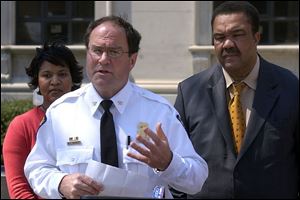
Toledo police expand database use to nab fugitives
4/20/2005
Flanked by Councilman Karyn McConnell-Hancock and Mayor Jack Ford, Chief Michael Navarre says that paying to extradite more suspects may be costly but is the right thing to do.
Reversing a long-standing policy, Toledo police have begun entering the names of rape and shooting suspects into a national database that improves their chances of capture anywhere in America.
The department yesterday began inputting the names of fugitives accused of rape, felonious assault, or aggravated assault into the FBI's National Crime Information Center - the system that allows police to check the background of anyone.
Previously, Toledo police commonly entered only murder suspects into the database to cut extradition costs.
Mayor Jack Ford said the cash-strapped city is willing to spend the extra money: "This expense, I believe, is minor when compared to the furtherance of justice."
At a press conference outside the police station, the mayor said the changes were prompted by a Blade article on Sunday that chronicled the case of David Delacruz.
Accused of a 1974 murder, Delacruz fled to Texas and police failed to input his name into the FBI database. After years of passing police background checks in Texas, Delacruz was arrested last fall after Toledo detectives used other methods to track him down. He is now awaiting trial in the Lucas County jail.
The Delacruz case highlights how departments across the country have struggled with using local, state, and national fugitive databases.
While some departments have mistakenly failed to enter fugitive information into such systems, such as the Delacruz warrant, The Blade article pointed out that some police departments, including Toledo's, do not enter most felony warrants into the national database because they can't afford to ship captured crime suspects from across the country.
During the press conference, Chief Mike Navarre said the department has double-checked other cases to ensure the remaining murder warrants have been entered into the FBI database.
But Mayor Ford and the chief said it's not enough to enter just murder warrants, and yesterday they broadened the policy to include rape - because of the propensity for offenders to rape again. The mayor said he included the two categories of felony assault because of the brutality of the crimes - such as shooting, stabbing, or beating - in which victims are left with serious injuries.
Still, the changes announced yesterday do not go as far as other departments' policies, and at least one Ohio criminologist said he was "dumbfounded" that more serious felonies aren't included, such as armed robbery.
"I can't imagine saying to victims of crime, 'You're victimization isn't worth it to us to bring the suspect back to prosecute,'●" said Steven Beck, a University of Cincinnati professor and a former police officer in a Cincinnati suburb.
Cincinnati police are willing to pay to extradite fugitives caught within 500 miles of the city if the suspects are wanted on first, second, or third-degree felonies. Beyond murder, rape, and felony assault, those categories of crime include robbery, kidnapping, manslaughter, extortion, child molestation, home invasion, and drug trafficking, among others.
Columbus police have an even broader policy: They'll pay to ship any fugitive captured anywhere in America who's wanted on a first, second, or third-degree felony - as well as a fourth-degree felony involving a crime against a person.
"They can run, but they're not going to hide from us," said Columbus Sgt. Brent Mull.
In restricting Toledo's automatic entry to murder, rape, and felony assault, Chief Navarre said the department "had to draw the line somewhere" and said detectives still can ask that particularly dangerous fugitives be extradited no matter where they're stopped.
"We wanted to see what the impact would be on the police department and on the city budget," the chief said. "We may decide to expand this."
Toledo police are working with administrators of the Northwest Ohio Regional Information System - the local criminal-justice database - to ferret out every active warrant for rape and felony assault. Under the old policy, Toledo police usually would pay the extradition costs for those fugitives if they were arrested in Ohio.
Chief Navarre said he did not know the number of fugitives entered into the nationwide database before yesterday and could only estimate that, with the policy change, 3,000 to 4,000 more names would be added.
To help pick up the costs of more extraditions, Mayor Ford said he would set aside $50,000 from the city's risk management fund.
Chief Navarre said it costs "a few hundred dollars" in most cases to extradite a fugitive, rising to $1,000 in cases of fugitives captured across the country.
"I did have a discussion with [the mayor] in his office this morning and I did express some concern about the expense that's associated with this change," the chief said. "And the mayor asked me the question: How would I feel if that was my daughter who was the victim of that rape or that felonious assault? That's really all he needed to say, because it is the right thing to do."
Contact Joe Mahr at:
jmahr@theblade.com
or 419-724-6180.